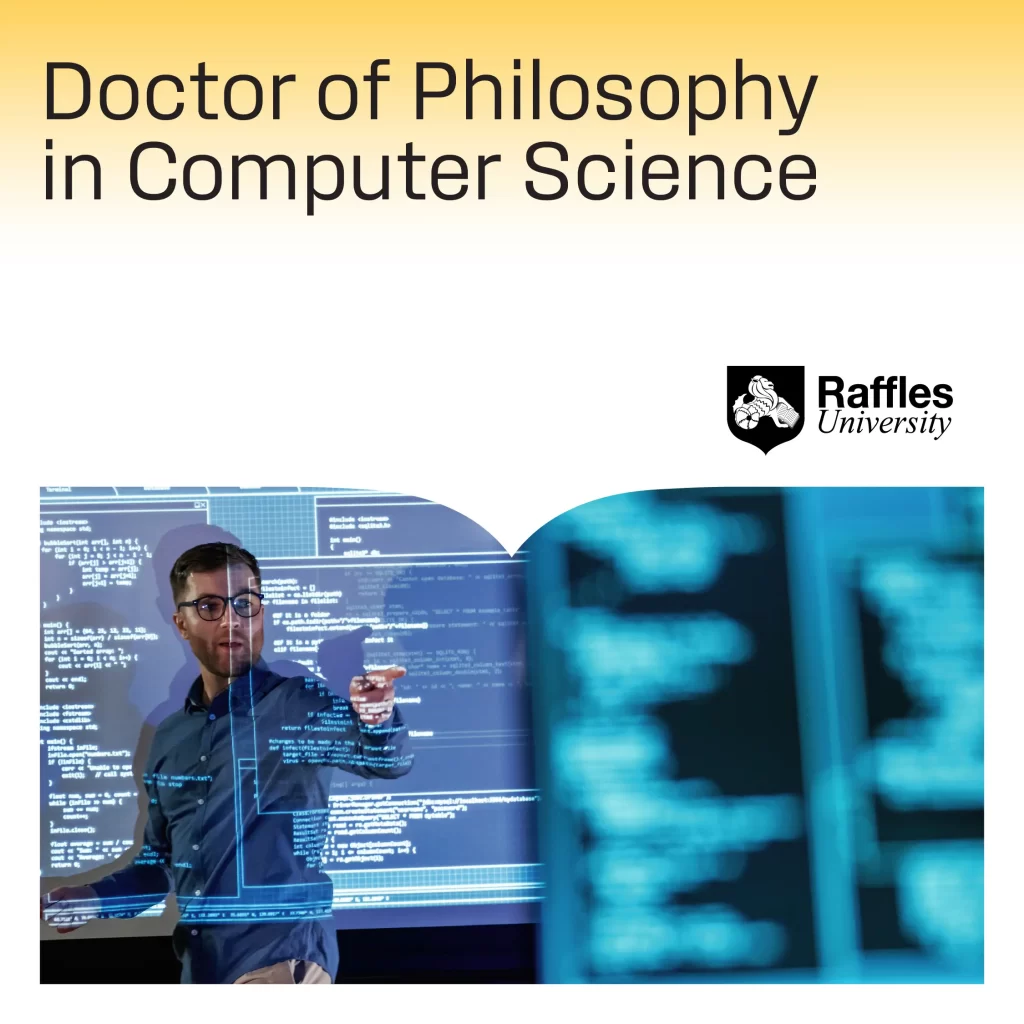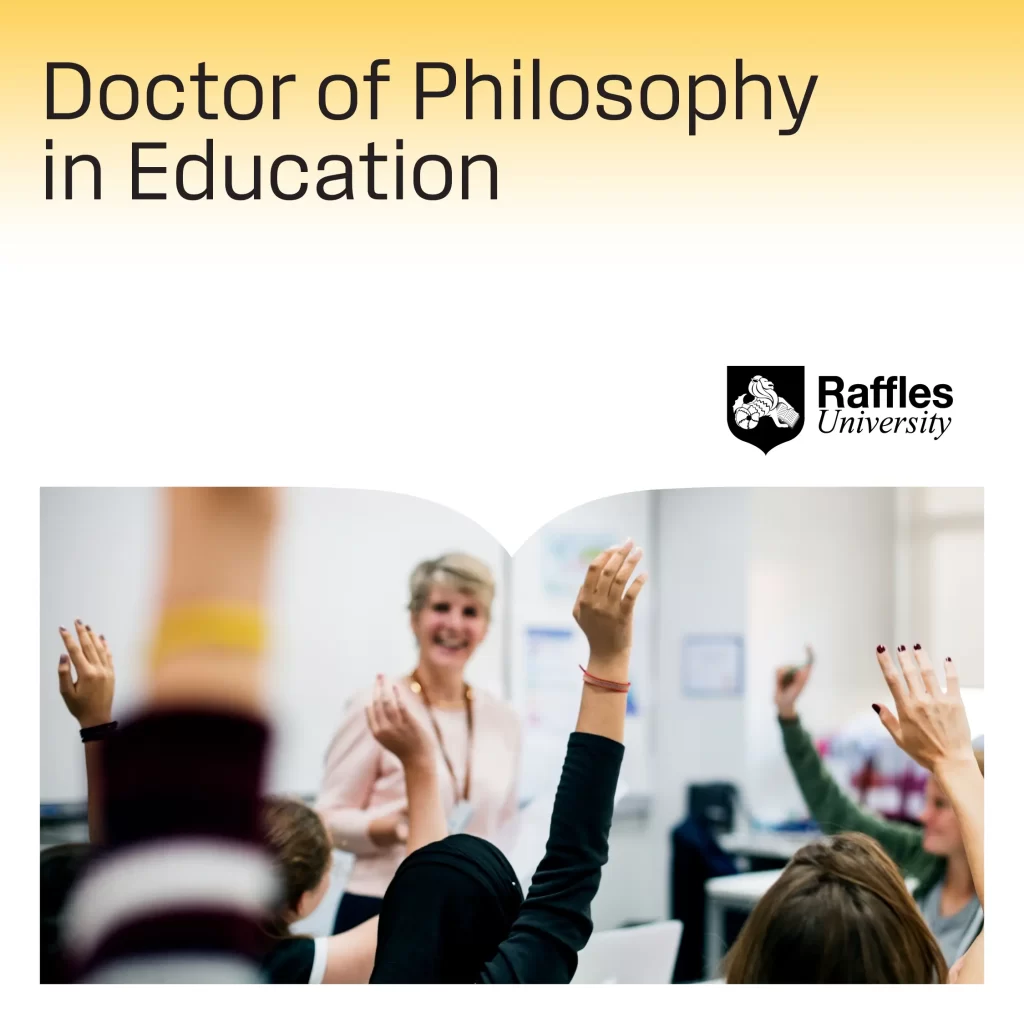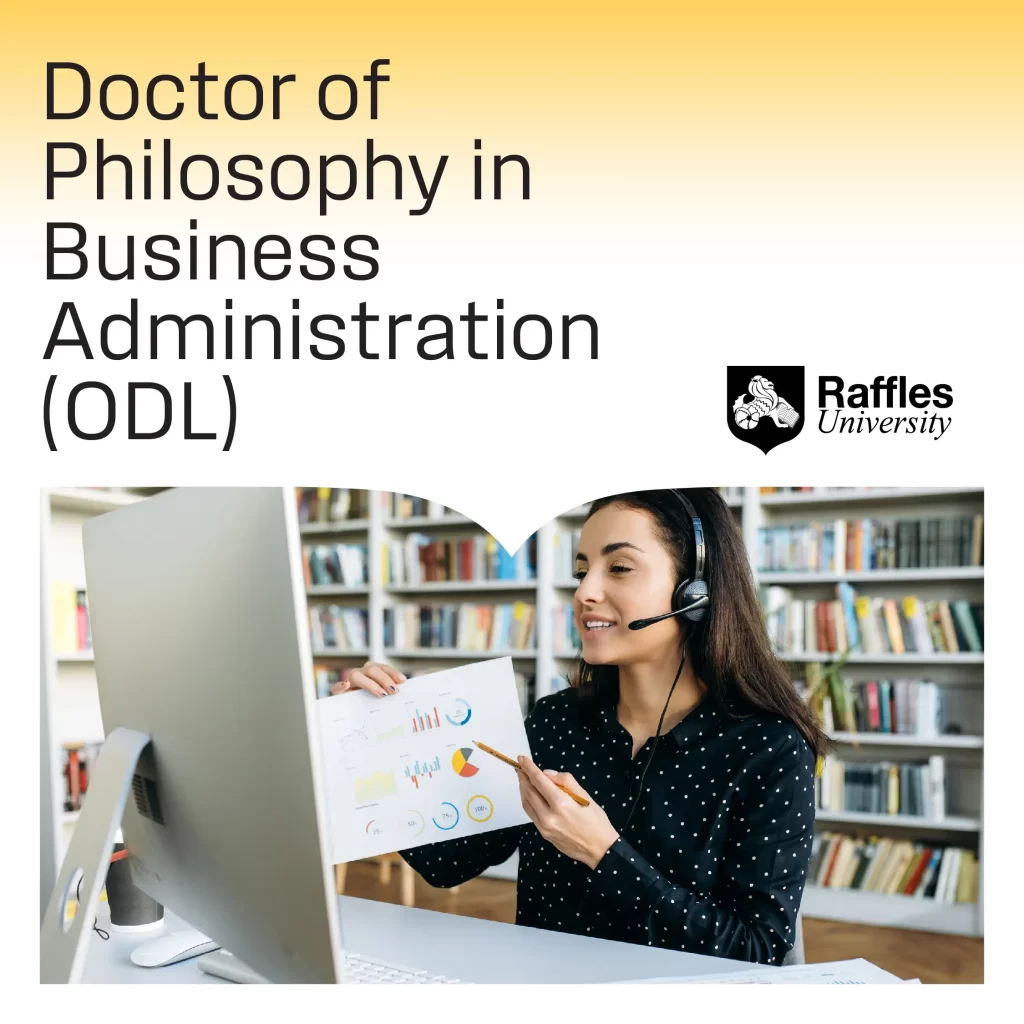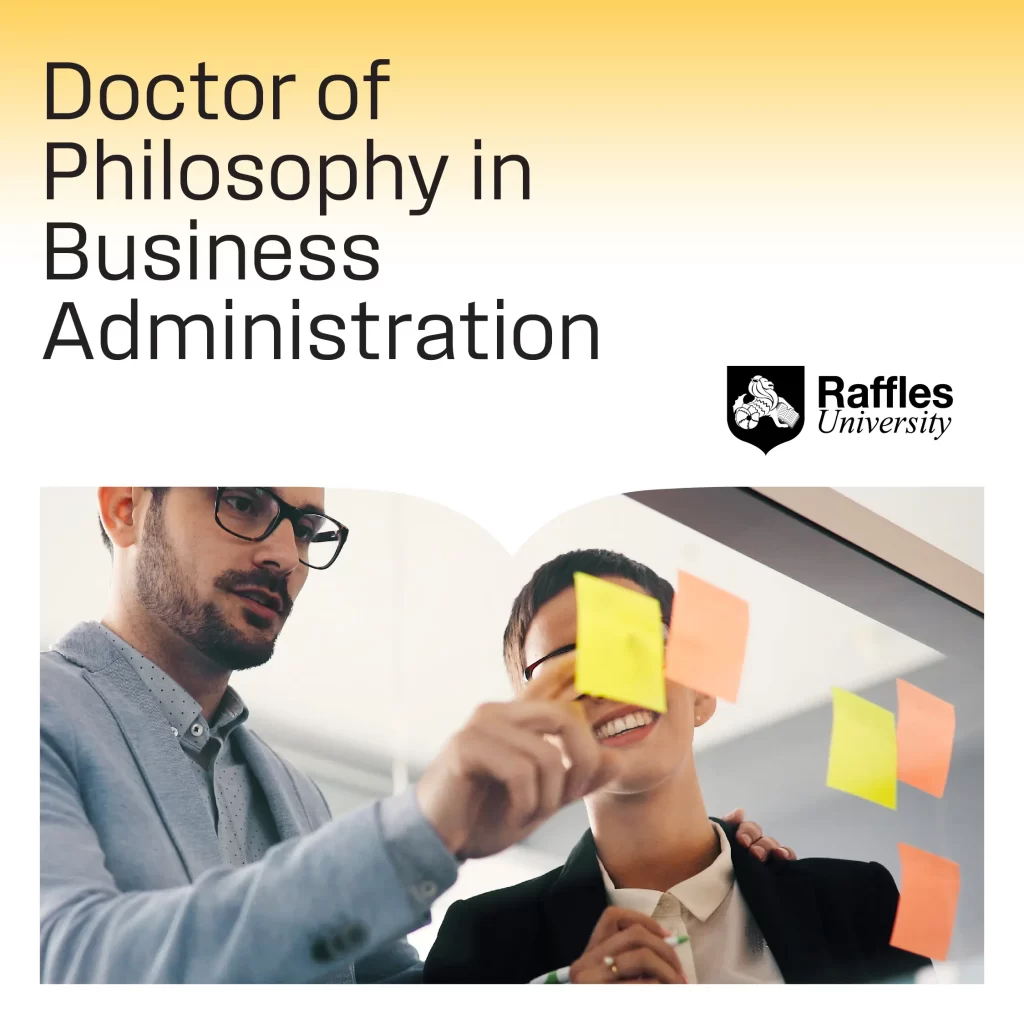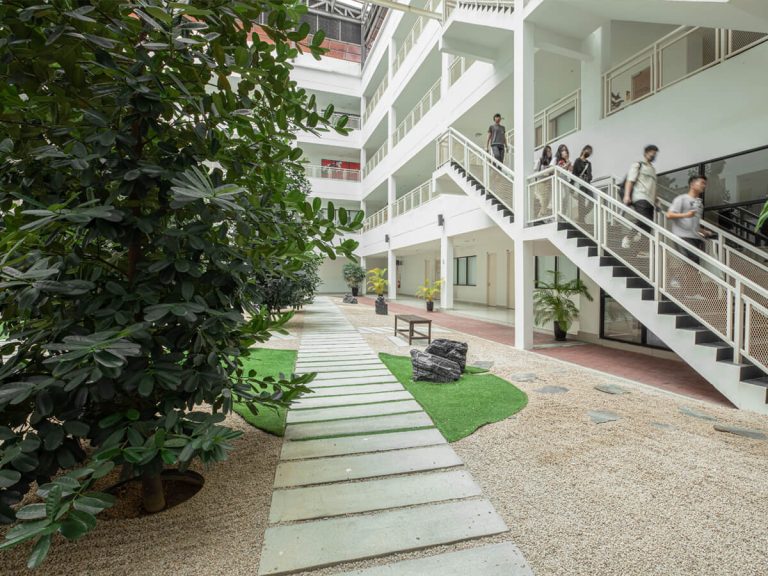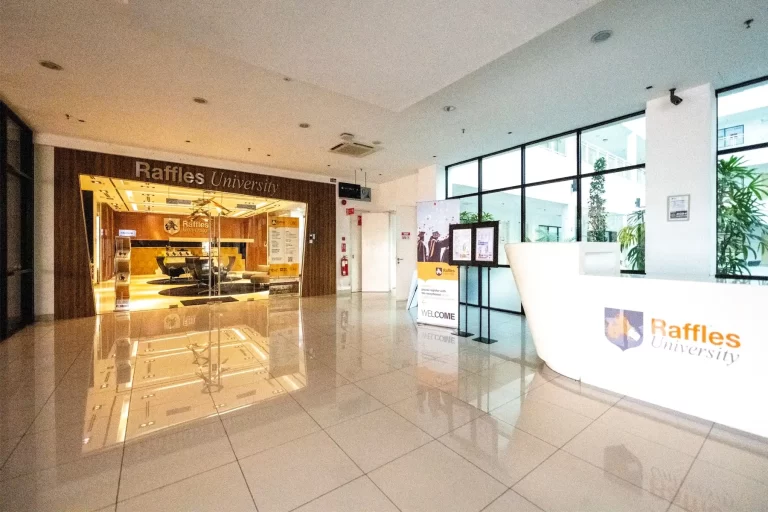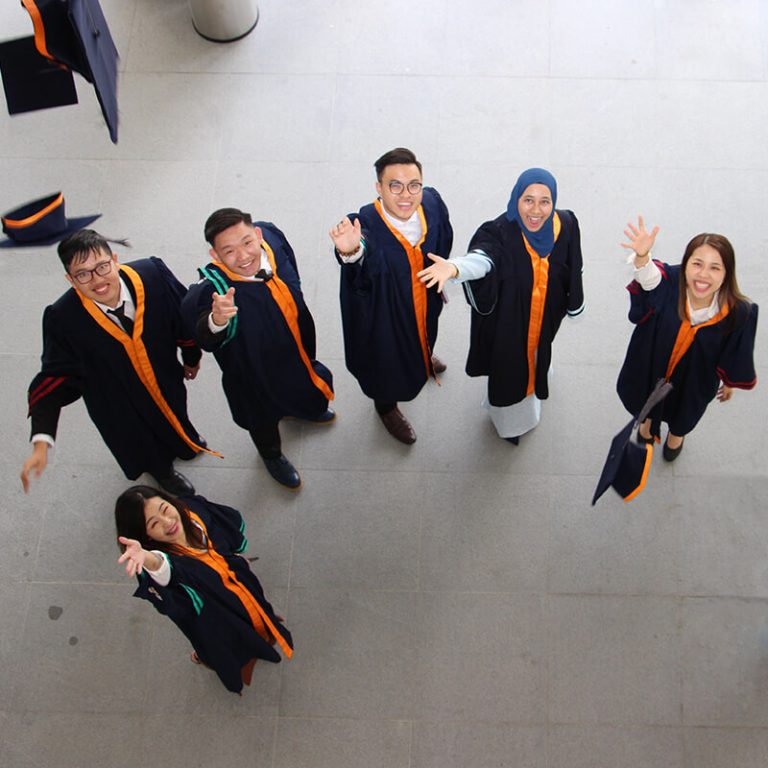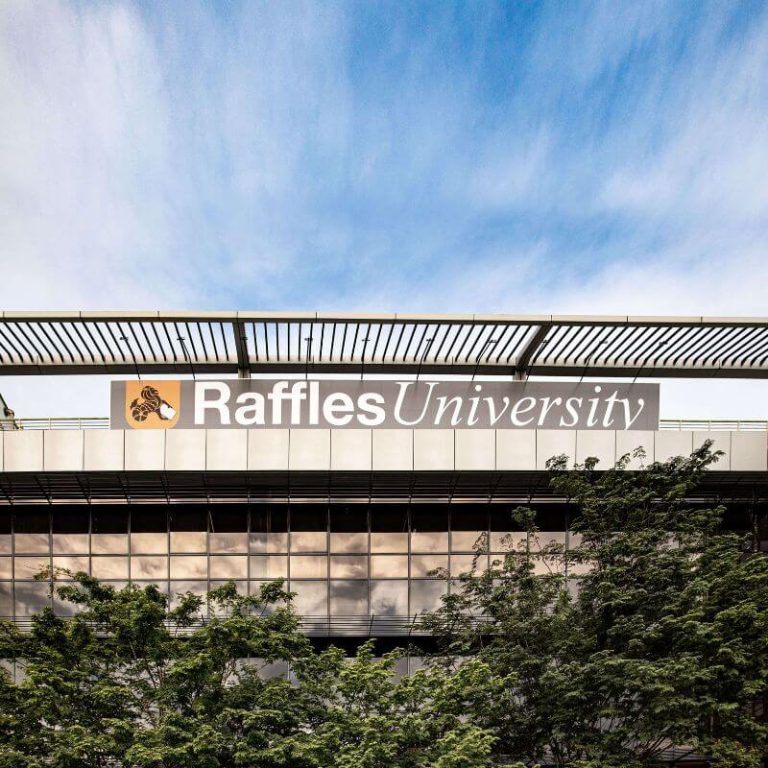POSTGRADUATE
Doctor of
Philosophy
in Education
Conventional
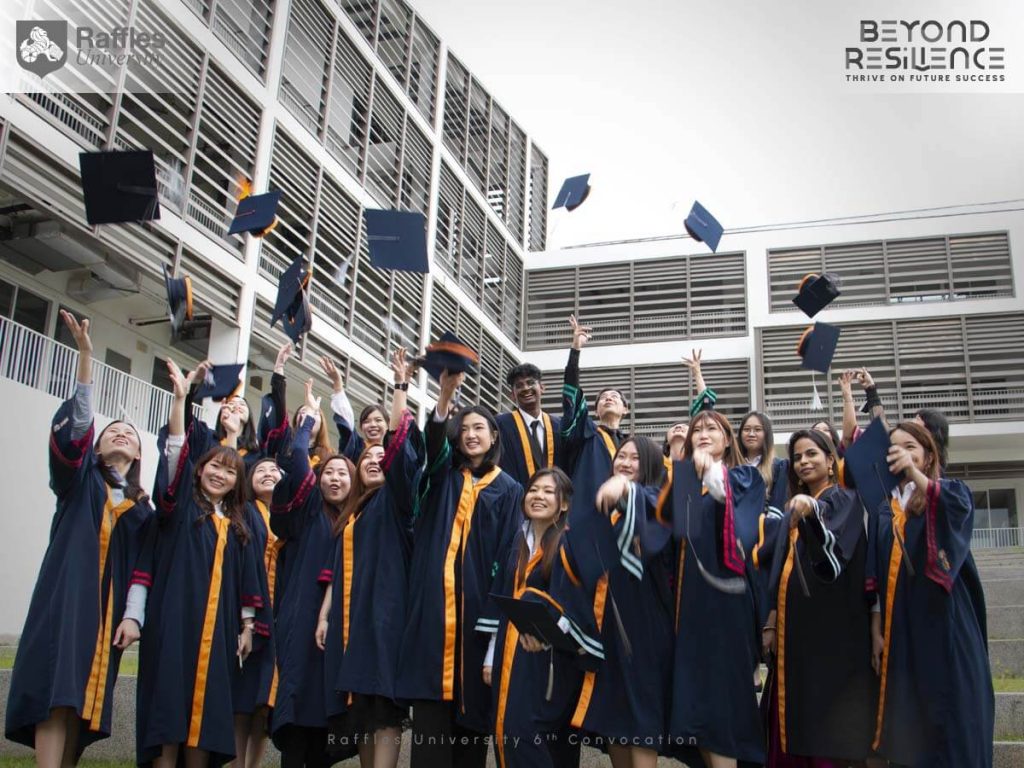
study pathway
Doctor of Philosophy in Education
RU BACHELOR'S DEGREE PROGRAMME
3 Years
MASTER OF EDUCATION
1 Year / Part-Time
DOCTOR OF PHILOSOPHY IN EDUCATION
3 - 6 Years / Part-Time
DOCTOR OF PHILOSOPHY
IN EDUCATION
MQA/PA 17349 | KPT/N/0110/8/0017 (06/2031)
The Doctor of Philosophy in Education is a full research programme meticulously crafted to cultivate a profound understanding and synthesis of knowledge within the diverse realms of education. Students will excel in communication, adeptly disseminating research findings, and engaging stakeholders, both within and beyond academia, to foster collaboration and advance educational practices. Ideal for those interested in education leadership, curriculum design, or learning technology, students will contribute to academic knowledge.
Upon completion, students will showcase a comprehensive grasp of a specific educational area, integrating insights from contemporary research. Equipped with refined research skills, graduates will be poised to drive meaningful change in education. Whether exploring innovative teaching methods or examining the role of sociolinguistics in learning, they will prioritize excellence and societal impact, thereby enriching the landscape of education for generations to come.
Programme Length:
3-6 Years (Full-Time) /
4-8 Years (Part-Time)
Programme Mode:
Research Mode
Programme Delivery Mode:
Conventional
Intakes:
January / May / September
100% RESEARCH BASED
PRESENTATION SKILL
CHOOSE YOUR PREFERRED AREA OF DISSERTATION
CRITICAL THINKING
Career Opportunities
Doctor of Philosophy in Education
– School Administrator
– Educational Consultant
– Instructional Coordinator
– Teacher Trainer
– Professor / Lecturer
– Educational Researcher
– Curriculum Developer
– Instructional Designer
– Education Policy Analyst
– Educational Technology Specialist
– Educational Programme Evaluator
– Director of Academic Support Services
Programme Modules
Doctor of Philosophy in Education
| Modules | A PhD Process | Expectation in a PhD |
|---|---|---|
Year 1 – Year 3 | 1. Identifying Research Problems and Objectives | – Carry Out Research |
PEO 1: Demonstrate a comprehensive understanding and the synthesis of knowledge in the field of Education.
PEO 2: Able apply a significant range of advanced and specialised skills and be able to act autonomously, professional and ethical practices in the planning and implementation of research.
PEO 3: Master numerical skills and research methodology, encompassing both quantitative and qualitative techniques and digital skills in educational setting.
PEO 4: Demonstrate ability to interact and communicate internally and externally in creative concepts or practices of educational research.
PEO 5: Demonstrate entrepreneurial mindset in progressing their career and profession.
*The programme module structure shown on this page is based on Intake A. The module is subject to change.
*The MPU Modules are translated to English. Please visit [here] for the original module name.
AREA OF DISSERTATION
| –Teaching and Learning in Higher Education –Management and Leadership in Education | –Curriculum and Teaching | –Educational Assessment |
If you are interested in other areas, please contact us to schedule a consultation with our programme director.
RESEARCHER PROFILE
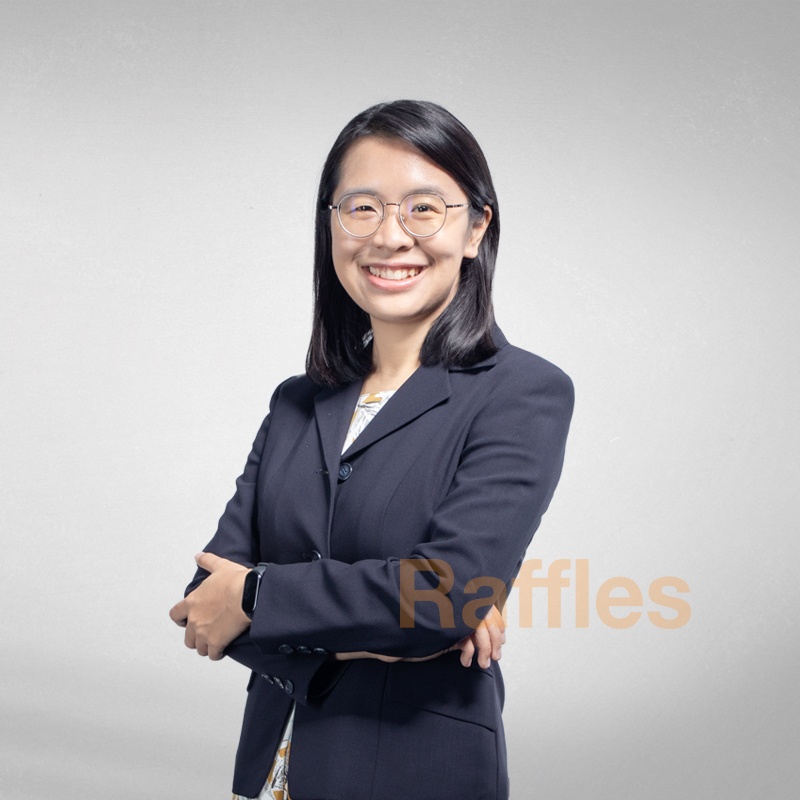
DR CHAI WEN JIA
– Cognitive Neurosciences
– Cognitive Psychology
– Positive Psychology
– Brain Health
– Neurorehabilitation
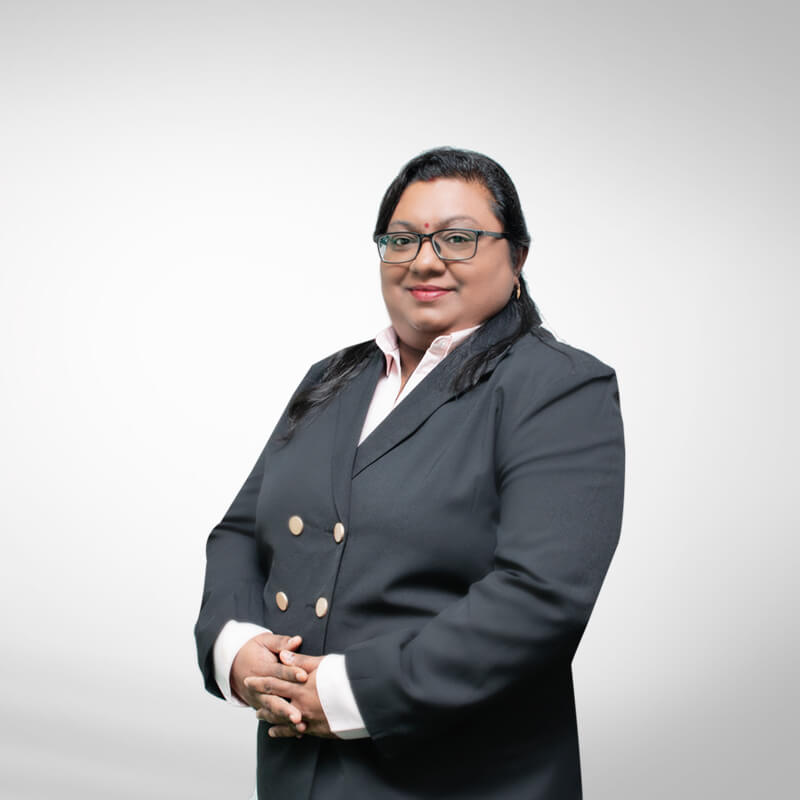
DR LOGENTHINI A/P MARIAPPAN
– Second Language Acquisition
– Curriculum Development
– Assessment and Evaluation
– Language Pedagogy
– Language Teaching Materials Development
– Cultural Competence, Educational Technology in TESL
– Teaching English for Specific Purposes (ESP)
– Bilingual Education
– Language Policy and Planning
– Teacher Training and Professional Development
– Sociolinguistics
– Gamification in Language Learning
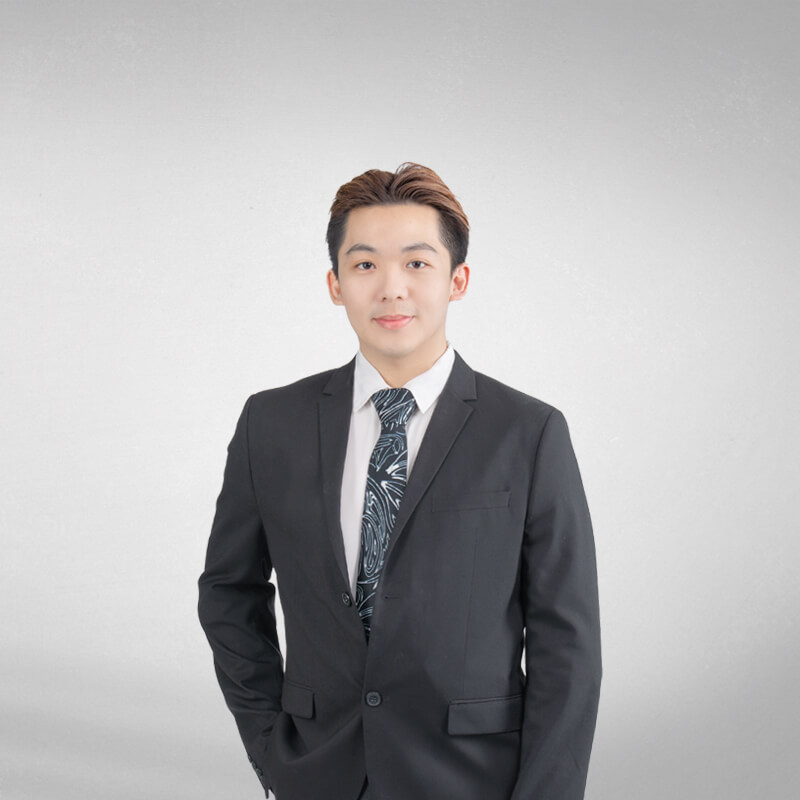
DR AMOS LIAN EN ZHE
– Art Therapy
– Psychoanalysis
– Dream
– Forensic psychology
– Qualitative studies and case studies
– Cross-cultural application
– Mental health disorders and treatment (especially trauma, personality disorders and depression)

DR SHUBASHINI A/P MATHIALAGAN
– Women’s health
– Public Health
– Obesity
– Discrimination and Stereotypes
– Parenting styles
– Addiction and substance use
– Stigma
– Dark personality
– Rule-breaking
– Mindfulness
– Third wave Psychotherapy
POSTGRADUATE SUPPORT
Centre for Postgraduate Studies (CPS)
- Postgraduate Study Handbook
- Postgraduate Study Admission Guideline
- Postgraduate Study Support
Centre of Professional Development (CPD)
- Networking & Industry Collaboration
- Commercialisation
- Industry Research
- Workshop & Seminar
- Short Training Course
- Career and Professional Development
Research Management Centre (RMC)
- Manage research project
- Research Grant for RU Academician and student
- Provide guideline and support in research publication
Centre for Innovative Teaching & Learning (CiTL)
- Open Distance Learning (ODL) Support
- ODL LMS Support
- Technology in Teaching & Learning
ADMISSION PROCESS
Prospective students are encouraged to contact Raffles University’s education consultants for expert advice on programmes, entry requirements, and scholarship opportunities. The consultants offer clear and personalised guidance, helping individuals navigate the admission process and explore financial support options.
Applicants must submit their highest academic qualifications and English language test results to fulfil the entry requirements. Depending on the programme, additional criteria such as a CV or interview may also be required. It is essential for applicants to carefully review the specific requirements for their chosen programme to ensure all necessary documents are submitted.
Applicants have the option to receive a Supporting Guidance on Writing an Effective Statement of Research Interest (SRI) as part of the admission process. This guidance offers guidance on creating a well-structured SRI that aligns with their academic goals. Additionally, it provides insight for both the applicants and the university, ensuring that the university’s resources and research direction are well-suited to the applicant’s interests.
The guidance may cover
- The structure and key components of a successful SRI.
- How to align research interests with the expertise of faculty members.
- Research design and feasibility.
- Examples of well-structured SRIs.
Once the Statement of Research Interest (SRI) is completed, applicants are required to submit it to the university. The university will then appoint a Faculty Evaluation Panel to review the SRI. This panel will carefully assess the applicant’s research interests, ensuring alignment with the university’s academic resources and research directions.
An interview will be conducted with the Faculty Evaluation Panel to provide constructive feedback on the applicant’s Statement of Research Interest (SRI). This interview offers a valuable opportunity for applicants to engage directly with faculty members, receive insights on their research interests, and discuss how they align with the university’s resources and objectives.
Accepted and Proceed to Admission with Adjustments: If the alignment and quality of the Statement of Research Interest (SRI) are moderate to strong, and the applicant demonstrates openness, the research can proceed with some adjustments.
Revise Research Topic and Resubmit SRI: If the alignment and quality of the SRI are below moderate and weak, but the applicant shows flexibility and commitment, revisions will be recommended to better fit the programme and faculty’s expertise. The applicant will need to resubmit the revised SRI for further evaluation.
Rejection and Alternative Programme: If there is no alignment and the quality of the SRI is weak, and the applicant refuses to adapt, guidance will be offered toward other programmes that may better suit their research interests. This ensures that the applicant can find a more suitable academic path.
RECENT PUBLICATION

Karen WONG Wee Fun
MBA (2017)
Being the leader of a sales team, I needed relevant knowledge to be able to lead and achieve our team’s targets. Although I have worked in this industry for a long time, higher qualification was necessary for me to move ahead in my career. I am glad to have met my lecturers and course mates whoo have guided me with their knowledge from working in their own industries.
Entry Requirements
Doctor of Philosophy in Education
– A Master’s Degree (MQF Level 7) in the education field or Education-related fields accepted by the HEP Senate;
– A Master’s degree (non-education) must undergo ***prerequisite courses;
– Other qualifications equivalent to a Master’s Degree recognised by the Government of Malaysia
Candidates without a related qualification in the field/s or working experience in the relevant fields must undergo appropriate prerequisite courses determined by the HEP.
*** Pre-requisite courses: Common Core Education foundation.
Malaysian Student
MALAYSIAN STUDENT ENGLISH ENTRY REQUIREMENT
Completed a Master’s Degree in English
IELTS: 5.0
TOEFL: 500
TOEFL Essentials (Online): 7.5
TOEFL iBT: 40
PTE: 47
MUET: Band 3.5
Cambridge English / Linguaskill: 154
*Students who did not meet the English Requirement are required to enrol the RU English Preparation Programme (EPP) AND achieve the requirement of any equivalent English qualification.
Contact us to receive the latest information about the tuition fee.
Click here to check the available scholarship.
International Student
INTERNATIONAL STUDENT ENGLISH ENTRY REQUIREMENT
Completed a Master’s Degree in English
IELTS: 4.0
TOEFL Essentials (Online): 5
TOEFL iBT: 30-31
PTE: 36
MUET: Band 3.0
Cambridge English / Linguaskill: 140
*International Students who did not meet the International English Requirement are required to enrol the RU English Preparation Programme (EPP) AND achieve the requirement of any equivalent English qualification.
Application Fee: RM4,500
Admission Fee: RM1,000
Administration Fee: RM15,000
Indicative Tuition Fee: RM47,500
Total Fee: RM68,000
(Approx. USD 16,200)
Contact us to receive the latest information about tuition fees.
Click here to check the available scholarships.
*The total fee will be subject to a 6% SST starting from 1st September 2025.
RELATED ARTICLES
- Blog
- News
- Events
Taspack Industry Field Trip
RU students visited Taspack Industrial Sdn. Bhd., one of the packaging solution companies in the region, for an immersive educational visit.
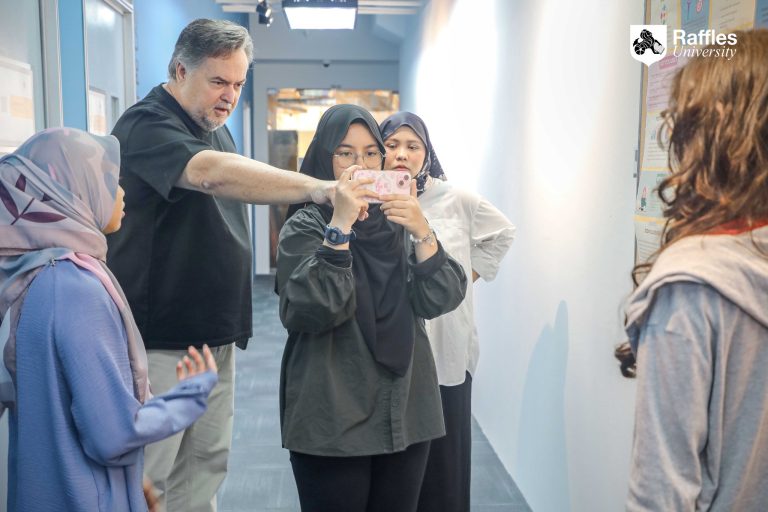
Make a Movie 3-Day Filming Workshop
Our 3-Day “Make a Movie” Workshop was a creative journey filled with learning, experimentation, and storytelling!
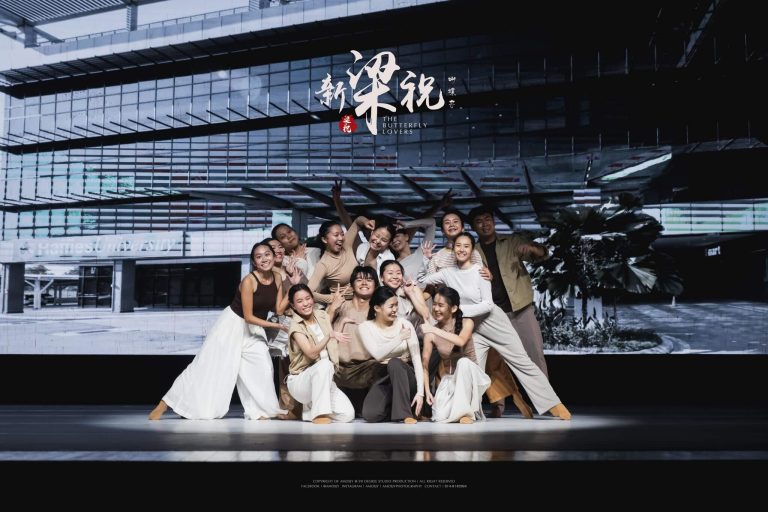
RU Designers Talent Powers at ‘The Butterfly Lovers’ Success
RU supports The Butterfly Lovers, showcasing student talent in fashion and multimedia on a professional stage.
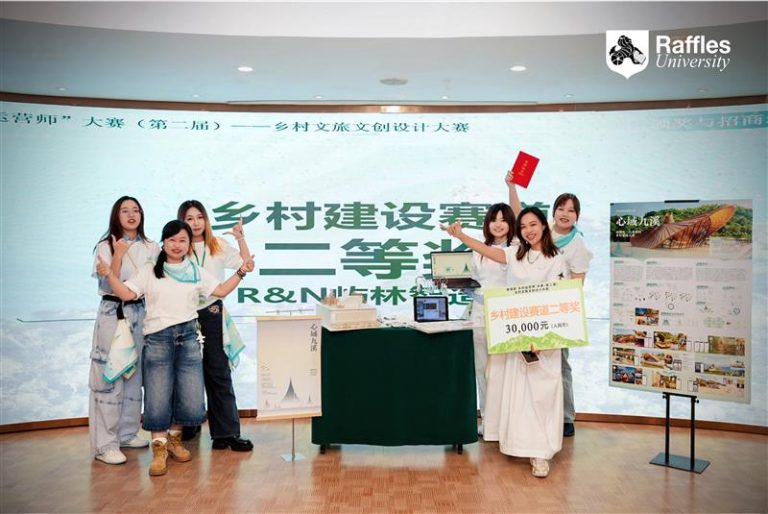
Awarded 2nd Prize at Nanao Village Rebranding Competition
RU was awarded 2nd Prize in the Nanao Village Rebranding Competition for its interdisciplinary project ‘心域九溪 JIUXI MINDSCAPE’.
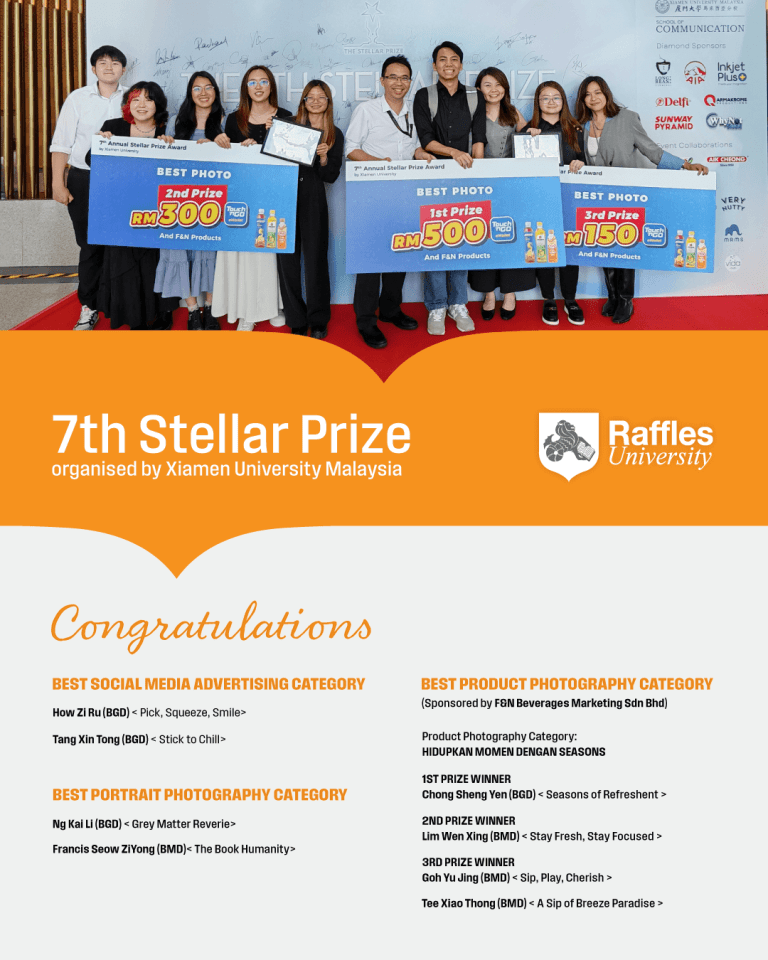
Shine at the 7th Stellar Prize Award Ceremony
Our Bachelor of Multimedia Design and Bachelor in Graphic Design students shine at the Stellar Prize Award Ceremony.
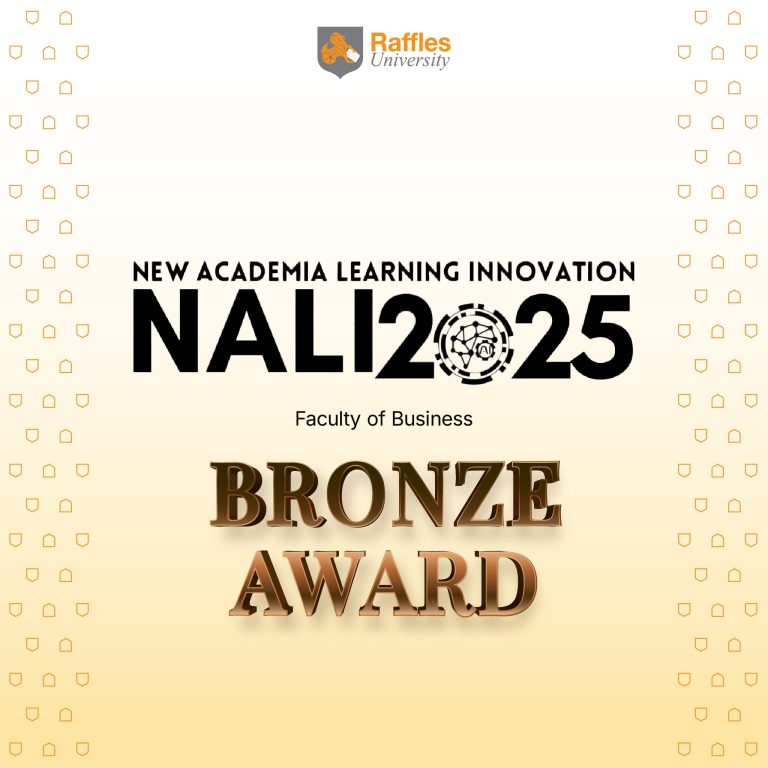
Bronze Award for IUCEL 2025
Dr Yang Chee Beng from Faculty of Business proudly achieved the Bronze Award for International University Carnival on E-Learning (IUCEL) 2025.

RU Designers Talent Powers at ‘The Butterfly Lovers’ Success
RU supports The Butterfly Lovers, showcasing student talent in fashion and multimedia on a professional stage.

Raffles Malaysia Fashion Show 2025: Celebrating Creativity
Raffles Malaysia Fashion Show 2025 showcased bold creativity from emerging designers of Raffles University and Raffles Kuala Lumpur.
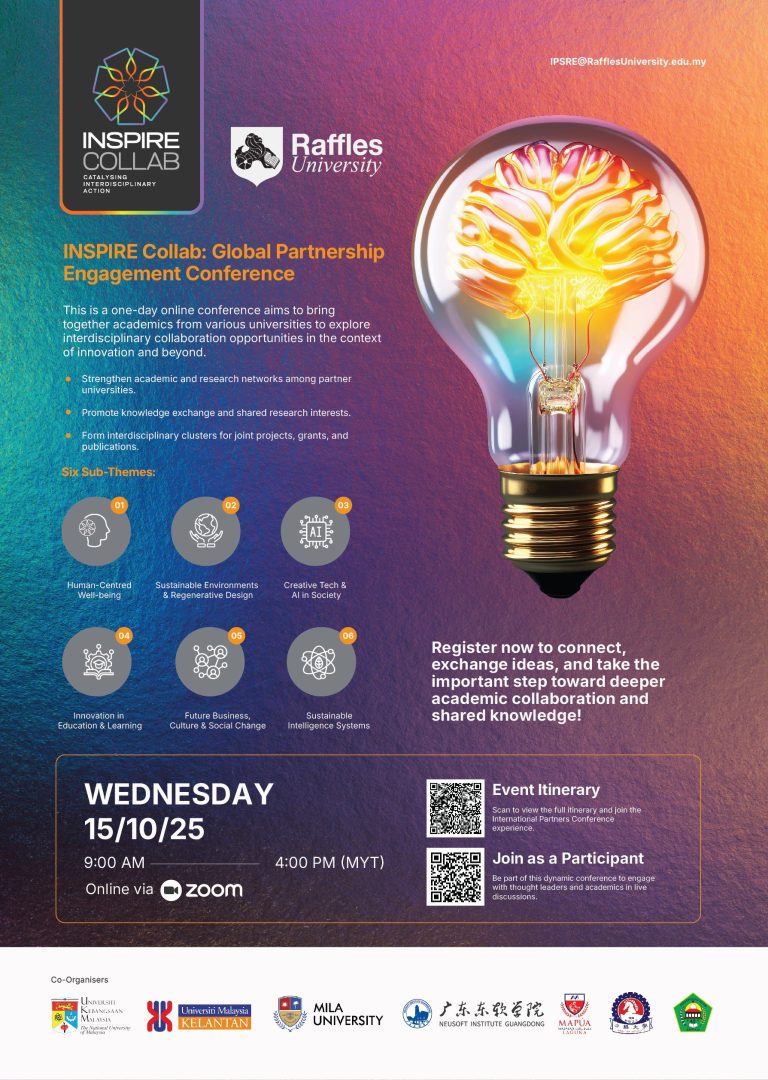
INSPIRE Collab 2025 | Catalysing Interdisciplinary Action
a one-day online conference initiated to bring together academics from different universities to explore interdisciplinary collaboration opportunities in the context of innovation and beyond.

